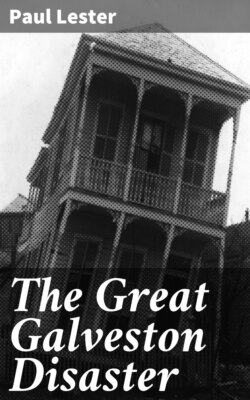Читать книгу The Great Galveston Disaster - Paul Lester - Страница 29
На сайте Литреса книга снята с продажи.
CHAPTER III.
Incidents of the Awful Hurricane—Unparalleled Atrocities by Lawless Hordes—Earnest Appeals for Help.
ОглавлениеTable of Contents
On September 11th, the Mayor of Galveston forwarded the following address to the people of the United States:
“It is my opinion, based on personal information, that 5000 people have lost their lives here. Approximately one-third of the residence portion of the city has been swept away.
“There are several thousand people who are homeless and destitute. How many, there is no way of finding out. Arrangements are now being made to have the women and children sent to Houston and other places, but the means of transportation are limited. Thousands are still to be cared for here. We appeal to you for immediate aid.
“WALTER C. JONES.”
On the same date the following statement of conditions at Galveston and appeal for aid was issued by the local relief committee:
“A conservative estimate of the loss of life is that it will reach at least 5,000, and at least that number of families are shelterless and wholly destitute. The entire remainder of the population is suffering in a greater or less degree. Not a single church, school or charitable institution, of which Galveston had so many, is left intact. Not a building escaped damage, and half the whole number were entirely obliterated. There is immediate need for food, clothing and household goods of all kinds. If nearby cities will open asylums for women and children, the situation will be greatly relieved. Coast cities should send us water, as well as provisions, including kerosene, oil, gasoline and candles.
“W. C. Jones, mayor; M. Lasker, president Island City Saving Bank; J. D. Skinner, president Cotton Exchange; C. H. McMaster, for Chamber of Commerce; R. G. Lowe, manager Galveston News; Clarence Owsley, manager Galveston Tribune.”
The white cotton screw men’s organization held a meeting and tendered their services, that of 500 able bodied men, to the public committee to clear the streets of debris. Big forces went to work, and the situation was much improved so far as the passage of vessels was concerned. The city was patrolled by regular soldiers and citizen soldiery. No one was allowed on the streets without a pass. Several negroes were shot for not halting when ordered.
The steamer Lawrence arrived here early on the morning of the 11th, from Houston, with water and provisions. A committee of one hundred citizens were aboard, among them being doctors and cooks. W. G. Van Vleck, General Manager of the Southern Pacific Railroad, arrived at the same time. He thought it would be possible to establish mail service from Houston to Texas City by night, with transfer boats to Galveston.
